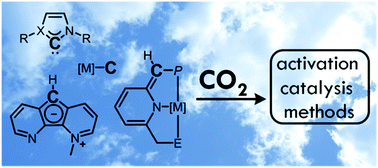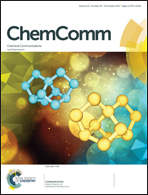Chemical reduction of CO2 facilitated by C-nucleophiles
Abstract
The abundance of atmospheric CO2 presents both an opportunity and a challenge for synthetic chemists to transform CO2 into value-added products. A promising strategy involves CO2 reduction driven by the energy stored in chemical bonds and promoted by molecules containing nucleophilic carbon sites. This approach allows the synthesis of new C–C or C–H bonds from CO2-derived carbon. The first part of this Feature article deals with uncatalyzed reductions of CO2 such as insertion into metal–carbon bonds and reactivity towards multidentate actor ligands and metal-free compounds. The second part covers catalytic reduction of CO2 in which a nucleophilic C-site is involved. This review brings together two general approaches in the chemical CO2 reduction field, showing how the discovery of fundamental reactivity of CO2 leads to synthetic applications, and proposes directions for further development.



 Please wait while we load your content...
Please wait while we load your content...